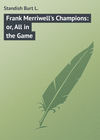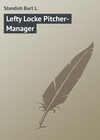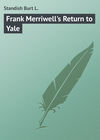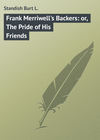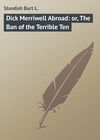Buch lesen: «Frank Merriwell's Champions: or, All in the Game», Seite 5
CHAPTER X – NELL’S LETTER
“How is Hammond this morning?” Frank anxiously asked of Browning, whom he joined near the boathouse. “Have the doctors found the bullet yet?”
Bruce had just come from the village, whither he had gone to make inquiry concerning Hammond’s condition.
“Yes,” he answered, as they walked together toward the cottage. “They extracted it this morning. It struck a rib, and the wound isn’t as bad as it might be. He’ll be laid up for a time, they say. There is no question but that he’ll get well.”
“I’m glad to hear it,” was Frank’s sincere rejoinder. “I thought he was a goner when I saw him drop near me at the crack of that gun.”
“Hello! what’s this?” Bruce exclaimed, a moment later, as they entered his room.
He stepped quickly to the little table, and took up a bunch of flowers, to which was tied a note, oddly scrawled and spelled.
It was from Nell Thornton, and this is what it said:
“I am ergoin’ ter slip in an’ put these on yer table, ’ca’se I hav’ heern that grand folks like ’em, an’ leeve this letter ’bout dad, ’ca’se I thot mebbe ez how you uns would want ter knowl. He hez knocked a hole in his ole still, an’ is ergoin’ ter leeve these mountings, he sez, an’ try ter be ’spectable. So good-by. I node frum the fust thet you warnt no revnoo.
“Frum your fr’end furever,“Nell Thornton.”
“She’s an all-right girl,” said Bruce, after a pause, “even if she is rather awkward.”
“Bedad, we had better be gittin’ out av the mountains before some more shootin’ takes place,” put in Barney.
“That’s right,” came from Harry. “One shot like that is enough.”
But the boys lingered for several days, and during that time their newly made friends did all possible to make the stay a pleasant one.
“We won’t forget you Yale boys!” cried one, on parting. “Let us hear from you, by all means.”
“Ve vill,” said Hans. “Put don’t neffer oxbect me to kill some more piks py mineselluf again alretty!”
There was a gay time at the parting, for a crowd had come to see them off as far as the railroad station.
It had been decided to make their way eastward to the Potomac River, for Diamond wanted to show his friends that beautiful stream of water.
“I’ve sailed on the Potomac many times when at home,” said the Virginian. “And I want to give you boys a sail, too.”
“All right – anything to take it easy,” sighed Bruce. “That mountain climbing was work enough to last a month.”
The ride in the train was enjoyed by all, and as they passed eastward, mile after mile, Diamond pointed out many objects of interest.
At last they reached the station to which their wheels had been sent, and here they left the train.
“There is an easy road along here,” said Jack. “I know you will all delight in a spin.”
Bruce groaned.
“More work – and just as I was getting so comfortably settled in that car seat, too.”
“Oh, brace up, Bruce!” cried Frank, cheerfully. “You’ve done well ever since we left New York. Don’t collapse on the last lap.”
“All right; I’ll brace up,” sighed the big fellow, and followed the others.
Toots had seen to it that the bicycles were polished to the last degree, so that they shone like silver in the bright sunshine.
For over an hour the crowd spun along over the road.
Then unlucky Hans ran into a hollow, throwing himself over the handle bars and twisting one of the pedals of his machine.
Luckily, there was a repair shop not very far off, and to this they took their way, where a machinist went to work on the wheel without delay.
While the others were waiting for Hans’ bicycle to be mended, Diamond called Frank to one side.
“Come down to the river with me,” he said. “I want to show you a particularly fine view.”
“How far?” asked Frank.
“Only about half a mile.”
“All right, I’ll go with you.”
And the two set off, never dreaming of the tremendous surprise in store for them.
CHAPTER XI – A TRAITOR AND A SPY
“Steady! steady!” roared a commanding voice. “Stroke, keep at it, and pick it up quicker on the beginning.”
The eight oarsmen in the boat were doing their level best, their oars flashing in the sunlight as they came dripping from the water to disappear again, sending the light craft flying along.
On the shore, which at this point was a high bank, the coach watched them as they skimmed past, and shouted his commands.
“Drive your legs at it, four! What are you in the boat for? Carry it through all the way. Up, now! Long swing! Great Scott! don’t think you’ve got to break your neck to recover because you pull hard on the stroke.”
He was a young fellow with a beardless face that plainly indicated his firm conviction that what he did not know was not worth finding out. His lips were red and full, and his entire bearing plainly betokened unlimited self-conceit.
He was dressed in a flannel outing suit, and wore a straw hat, about which was a bright red ribbon. His necktie, also, was bright red. On his feet were well-polished russet shoes. There was a diamond in his tie, and diamonds set in the rings on his fingers.
It seemed at a glance that this lad had “money to burn.” His swell appearance was enough to make almost any ordinary boy regard him with envy and admiration. And his manner would impress an ordinary boy with his astonishing knowledge and importance in the world.
“Oh, say!” he shouted; “what do you chaps think you are doing? Feel for the water. Be delicate and gentle when you are coming forward. This is not a question of bull strength. If it was, a crew of longshoremen and freight handlers could row all around you.”
Not a word from the sturdy, sun-browned young fellows in the boat. They were there to obey, and to stand such abuse as this insolent, overbearing coach saw fit to heap upon them.
“Great Scott!” cried the coach, once more. “You chaps make me sick! Will you never get onto yourselves? There you go, five! Can’t you see what you’re doing? You’re pulling out, and you are wasting the end of your stroke. You are finishing ahead of four every time. It would take a club to beat anything into your head! Vast, turn around, coxswain.”
Then this important person fell back a step, and spoke to another lad, who was concealed by some bushes, from which he was peering at the crew in the boat.
“A lot of lubbers,” said the coach, contemptuously. “You fellows needn’t worry about them. You’ll show them clear water from the start.”
These words were uttered in a low tone, so they could not be heard by the rowers.
The boy hidden in the bushes laughed softly.
“You are playing them for suckers, all right, Harlow,” he said; “but it does seem to me that they are improving under your coaching. Look out and not make them so good that they will stand a show of winning over A. A. C.”
“If they didn’t improve, they wouldn’t keep me as coach,” returned the other; “but I’ll knock the stuffing out of them at the last moment by advising the removal of a good man and the substitution of a poor one. I want them to have enough confidence in me by that time so they will do exactly as I say.”
Two other lads, in bicycle suits, unseen by the treacherous coach and the spy in the bushes, having left their wheels near the highway that ran some distance from the river, had come down and stopped near enough to hear all this conversation.
They were Diamond and Frank.
Diamond had brought Merriwell to that point in order to show him the pretty view of the Potomac River, and not till they had advanced more than two-thirds the distance from the road did they hear the shouted cries of the coach, and see him standing on the bluff.
The curiosity of the boys was aroused, and they came forward quietly to see what was taking place.
The coach, and the spy in the bushes, were so absorbed in the movements of the crew that neither saw Merriwell and Diamond, and so, without thinking of playing eavesdroppers, the Yale lads heard something that was not intended for their ears.
Jack clutched Frank’s arm.
“What do you think of that?” he hissed, his dark face growing still darker.
“Think,” said Frank, scornfully. “I think that coach should be ducked in the river!”
“And I think the spy should be ducked with him!” came fiercely from the lips of the young Virginian.
“Look here, Jack!” said Frank, “there is something familiar about that fellow in flannels. I’ve seen him before.”
“His voice sounded familiar to me,” nodded Diamond.
At this moment, as if he had heard their voices, the coach looked in their direction, and saw them. He gave a violent start, seemed a bit confused, and then cried:
“What are you doing there – playing the spy? Don’t you know you have no right there?”
In another instant Frank was bounding toward the spot, followed by Jack.
“No, we are not spying,” said Merriwell, “but we know a chap that is! Here he is!”
Then he pounced on the startled youth in the bushes and dragged him forth, for all of his resistance.
“Let me go, hang you!” came from the fellow Frank had exposed. “If you don’t let me go, you will be sorry!”
“I’ll let you go when I have shown you to the gentlemen in that boat down there,” declared Frank. “I have dealt with sneaks like you before.”
The spy struggled desperately, furious at the thought of exposure and disgrace.
“You shall suffer for this!” he grated.
Then the coach advanced quickly on Merriwell, speaking in a low tone, although his voice quivered with passion:
“Let him go – let him go! If you don’t – ”
“What then?” said Jack Diamond, placing himself in the path of the treacherous coach. “What do you think you will do about it, my fine fellow?”
“I will – Great Scott! It is Jack Diamond!”
The coach staggered from the shock of the discovery, for up to that moment he had been too excited to recognize either of the boys. Now he looked at the other, adding, hoarsely:
“And that’s Frank Merriwell! Satan take the luck!”
This attracted Frank’s attention, so he turned and took a square look at the coach, in whose appearance he had fancied there was something familiar from the very first.
“Great Jove!” he cried. “Rolf Harlow!”
The name and the sight of its owner awakened a host of unpleasant memories in Frank’s heart.
Harlow, expelled from Harvard for gambling and cheating at cards, had come to New Haven in search of “suckers” among the Yale students. He had been introduced by a student by the name of Harris, and Frank, whose one great failing was his strong inclination to play cards for a stake, had been drawn into the game in his endeavor to pull Rattleton out of it.
In the end it had proved fortunate that Frank was led into the game, for he had detected Harlow in his crooked dealing and exposed him, compelling him to give up certain of Diamond’s promises to pay, and thus saving Jack from disgrace.
Harlow was revengeful, and he had tried to “get square” with Frank, but each attempt had rebounded disastrously upon him. When last seen, Rolf was following a circus through the State of Missouri, and working a shell game on the country people.
Now he was in Virginia, coaching a crew of oarsmen who were practicing for a race!
And, as usual, he was playing a crooked game.
The crew in the boat saw the struggle on the shore, and wondered what it meant. There was a landing near, and toward it the coxswain directed the boat, saying:
“Pull, fellows! We must go up there and investigate this affair. We have been watched.”
Harlow turned very pale when he recognized Frank, for he had learned to fear our hero. He had not dreamed they would meet in Virginia.
As soon as Diamond could recover from the astonishment of the discovery, he scornfully cried:
“Harlow it is, and he is up to his old tricks!”
The spy, whom Frank had captured, made a savage attempt to thrust Merriwell from the edge of the bluff into the river, seeing the crew was coming, and he soon would be face to face with a lot of angry lads who might not have any mercy on him.
“Easy, my fine chap!” laughed the Yale athlete. “What’s the use! You can’t do it, you know!”
“Help, Harlow!” appealed the spy. “The Blue Cove fellows are coming, and they’ll be awfully mad!”
Harlow hesitated, and then a desperate light came into his eyes. Young ruffian that he was, he always went armed, and now he decided to make an attempt to bluff Frank.
With a quick movement, Rolf produced a revolver, which he pointed straight at Merriwell, crying:
“Let him go – let him go, or I’ll shoot!”
The expression on his face seemed to indicate that he really meant it, and Diamond shivered a bit, knowing Harlow as he did, and thinking him desperate and reckless enough to do almost anything in a burst of passion.
Jack crouched to move aside, so he could spring at Rolf, but Harlow saw the movement, and hissed:
“Stand still there, or I’ll shoot you first!”
“You don’t dare – ” began Jack.
“Don’t I?” interrupted the desperate lad with the revolver. “You’ll find I do! I’ve been jumped on by you fellows till I can’t stand any more of it! This is a case of self-defense, and I can prove it so. You attacked us! I have a right to defend my life!”
It was plain that Harlow was trying to convince himself that he was in the right, and, could he do so, hating Frank Merriwell as he did, it was certain that he might shoot on the slightest provocation.
Jack stood still; for the moment he knew not what to do.
“Come here, Diamond,” called Frank, sharply. “Come quick! Don’t mind that fellow! If he does any shooting, I won’t leave much of a job for the lynchers! I believe they string people up down in this State in a hurry!”
“Stand where you are, Diamond!” shouted Harlow.
But Jack obeyed Frank, and Harlow did not shoot.
“Now, hold this spy, and I will deal with that crook,” said Frank, turning the lad he had captured over to Jack.
As soon as he had done this, Merriwell started to walk straight toward Harlow, who still had him covered with the revolver.
“Stop!” shouted Rolf, fiercely; “stop! or by the Lord Harry, I will shoot!”
“Oh, no, you won’t,” answered Merriwell, with the utmost confidence, as he calmly continued to advance, apparently as unconcerned as if it were a toy pistol in the hand of his enemy.
Harlow hesitated, and gasped. Reckless though he was, intensely though he hated Frank, he had not the nerve to shoot the cool lad down.
Through Harlow’s head flashed a thought. What if he should pull the trigger, and the revolver failed to go off? He knew Merriwell would be on him like a furious tiger. He knew Merriwell would have no mercy.
He dared not try to shoot. The eyes of the Yale athlete were fastened steadily upon him, and there was something in their depths that made him falter.
One, two, three seconds, and then Frank’s hand grasped the revolver and firmly turned it aside. Harlow seemed incapable of resistance, and, to his own astonishment, as well as to the unutterable amazement of the witnesses of the act, Frank took the revolver away without being resisted.
Diamond was paralyzed by the nerve of his friend. Although he had known Frank long, and thought he knew him fully, this act was a revelation to him.
Then it was, while Diamond was staring and muttering, that the spy suddenly struck him a terrific blow behind the ear, sending Jack to grass.
For an instant Diamond was stunned, and when he recovered, the spy was far away, running as if his very life depended on it.
Jack scrambled up as quickly as he could, and would have followed, but Frank called:
“Let him go! It’s useless to chase him.”
“Well, that was a fool trick of mine!” growled the Virginian, disgusted with himself. “I ought to have a leather medal!”
The boat’s crew had made a landing, and now they came toward the spot on a run. Handsome, manly young chaps, from sixteen to nineteen, they were.
“Genuine Virginians, they are!” muttered Jack, admiringly. “They don’t grow anything better anywhere!”
Harlow seemed cowed by what had taken place.
Since being disarmed without a struggle, all the spirit seemed to have left him. He stood still, looking sullen and uncertain, as if not quite sure what to do.
Up came the oarsmen, a solid-looking, brown-eyed lad in the lead.
“What’s all this about, anyway?” he sharply asked, addressing Rolf. “Who are these chaps, and what are they doing?”
An idea came to Harlow; he grasped at it.
“They are spies – enemies!” he quickly declared. “They were watching here in the bushes. They must be connected with the Alexandria fellows.”
Then the rowers, sunburned and brawny appearing, gathered about Frank and Jack, regarding them with anything but pleasant looks.
“Give it to ’em!” shouted Harlow, hoping to set the boys on Frank and Jack before any explanation could be made. “See here – don’t you see one of them threatening me with a revolver? They are desperadoes!”
“In that case, gentlemen, perhaps it would be well enough not to push us too hard,” coolly observed Frank, as he moved the muzzle of the revolver about in a careless manner. “Just give us time to say something for ourselves.”
“Don’t listen!” cried Rolf, wildly. “They will try to lie out of it, but I saw them spying!”
“Who was the chap that ran away?” asked the leader of the oarsmen, the stroke, whose name was Kent Spencer.
“He was one of them,” asserted Harlow.
“In that case, it is odd we didn’t run away with him,” smiled Frank. “We might have done so, you know.”
“Well, why didn’t you?” asked Spencer.
“Because there was no reason why we should run, and several reasons why we should stay. We can tell you a few things that may surprise you.”
“Don’t listen to their lies!” shouted Harlow. “Pitch them into the river! It’s what they deserve!”
For a moment it seemed that the young oarsmen would obey him. They seemed about to precipitate themselves on the strangers. Again Frank’s coolness caused a delay.
“If you want to souse us in the river after we have made our explanation, you can do so,” he smiled; “but isn’t it well enough to hear what we have to say first?”
“I don’t see that it can do any harm,” admitted Spencer. “Give the fellows a show, boys, but don’t let ’em get away.”
This did not suit Rolf Harlow at all, but he saw it was useless to try to urge the oarsmen on. They were inclined to obey Spencer.
“All right!” he grated; “listen to their lies, if you like. You’ll be disgusted when you hear what they have to say.”
Spencer eyed Harlow closely, wondering why he should be so eager to keep the strangers from speaking. He seemed to fear something that he knew would be said.
“As for lies,” said Frank, “if I am not mistaken, I fancy you will hear a few from this fine gentleman who has been coaching you, but who is a traitor to you at the same time.”
“A traitor!” cried Spencer. “Be careful! Mr. Harlow is a gentleman and a student of Yale College.”
“A what?” shouted Diamond.
“A what?” echoed Merriwell. “Why, the nearest this fellow ever came to the inside of Yale College was Jackson’s poker joint in New Haven. If he has represented himself as a student of Yale, it shows he began by lying to you right off the reel. This fellow was expelled from Harvard, and was drummed out of New Haven for cheating at cards! That’s the kind of a bird he is!”
CHAPTER XII – HARLOW’S DISCOMFITURE
Something like a grating imprecation escaped Harlow’s lips, and it seemed that he would leap for Frank’s throat.
But the revolver was still in Merriwell’s hand, and, somehow, its muzzle wandered around, and stopped when it covered Rolf.
The accused lad literally gnashed his teeth.
The others were aghast for a moment, and then Kent Spencer seriously said:
“Look here, sir, you will have to prove that charge. Otherwise, you will find you have made a big mistake in accusing a gentleman of being a blackguard.”
“I can prove it without a struggle,” assured Frank.
“How?”
“In several ways. To begin with, I am a student at Yale myself. It was in New Haven I first met this crook. I exposed him when he was bleeding some of my friends by playing poker with them and using marked cards.”
“A lie!” Harlow almost screamed; “a vile lie!”
“It is the truth,” asserted Jack Diamond. “I was in that game. Harlow beat me, and he would have beaten me worse but for Mr. Merriwell.”
“Mr. Who?” Spencer shouted.
“Merriwell.”
“Who is Mr. Merriwell?”
“That is Mr. Merriwell right there,” said Jack, nodding toward Frank.
“Frank Merriwell – Frank Merriwell, the ball player and all-around athlete?” questioned Spencer, excitedly.
“That’s who he is,” assured the Virginian.
“Then Mr. Harlow should be very well acquainted with him,” said the stroke of the crew, “for he has said that Frank Merriwell is his particular friend.”
“Yes,” spoke up another, “he referred us to Frank Merriwell when he applied for the position to coach our crew.”
“My eyes! what a crust!” shouted Diamond. “I never heard of such cheek! He referred you to Merry because he thought you could not reach him by letter as he knew Merry was somewhere out West on a bicycle tour.”
“All of us had heard of Mr. Merriwell,” said Spencer. “We saw his name in the papers often. A sporting magazine spoke of him as the destined leader in baseball and football at Yale. Besides that, I know a person who is personally acquainted with him. Naturally, when Mr. Harlow declared that Frank Merriwell was a particular friend of his we were inclined to regard him with favor, and I am greatly astonished to discover that he has been deceiving us.”
Harlow looked disgusted.
“I presume you are ready to take the word of these strangers against me!” he exclaimed. “I didn’t think that of you, but – ”
“If this is Frank Merriwell, why shouldn’t we take his word?”
“How do you know he is Frank Merriwell?” demanded Rolf.
“I can prove that with ease,” smiled Frank, thrusting his hand into his pocket and pulling forth some letters. “Here is some of my correspondence, here is my card, and here is my name and address on this key check. If you want further proof, gentlemen, I can show you my name marked upon my clothes.”
“That is quite enough,” assured Spencer. “We are satisfied that you are what you represent yourself to be. And now will you be good enough to tell us the meaning of this struggle here on the bank?”
“With pleasure,” bowed Frank. “My friend here, Jack Diamond, a Virginian born and bred, asked me to leave the road over yonder and come here, where he could show me a pretty view of the Potomac. We locked our bicycles to a tree, where it was not likely they would be seen, and came this way. As we approached, we saw this chap in flannels standing on the bank and shouting his orders to your crew. Curiosity brought us nearer, and then we heard him talking with another chap who was hidden in the bushes where he could watch your work. From what we overheard – ”
It was getting too hot for Harlow, and he interrupted Frank.
“It is plain to me,” he cried, “that you are ready to take the word of a stranger instead of mine, and that is too much for me to stand. That being the case, I’ll leave you with your new friends.”
He was about to hurry from the spot, but Frank checked him.
“Hold on, Harlow,” he said, suavely. “I have your revolver, you know.”
“Then give it to me!”
“Come take it.”
Although thus invited, Rolf did not hasten to obey, for the muzzle of the weapon was looking straight at him.
“I thought you would wait a while,” nodded Frank. “You shall have the gun directly.”
Then he continued his story:
“From what we overheard, we learned that your coach and the spy in the bushes were in league with each other. Evidently, the spy belongs to a rival crew, and he was watching to get points from your work.”
Exclamations of anger broke from the rowers, and it was plain they were greatly incensed.
Harlow fidgeted uneasily. A short time before, he had been very popular among these fellows, but now they regarded him with distrust and positive contempt.
All through Frank Merriwell! How he hated Merriwell!
“It was one of the A. A. C. fellows!” cried a red-headed fellow, whose name was Fred Dobbs. “I thought I recognized him from the river.”
It was plain that Spencer was loath to believe such a thing about any person.
“Why should Mr. Harlow betray us?” he asked, in an undecided way.
“That’s it!” cried Rolf, catching at this as a drowning person might catch at a floating chip. “Why should I do such a thing?”
“He’ll do anything for money!” scornfully exclaimed Jack Diamond.
“And the Alexandria fellows have money to burn,” came from Fred Dobbs. “They are furious because we won the championship of the Potomac last year, and they mean to win it back this year by fair means or foul. I can understand why they should buy up our coach.”
“But Harlow has seemed to work for our interest thus far,” said another. “Surely we have improved under his coaching.”
“If you hadn’t you would not have confidence in him as a coach, would you?” asked Jack.
“No, of course not.”
“Well, that’s just where he has been playing his card shrewdly. He wanted you to have enough confidence so you would make up your crew at the last minute just as he directed. That would settle it.”
Harlow saw the case had gone against him.
“Settle it to suit yourselves!” he cried. “This is the first time ever I was treated like this! I fancied they raised gentlemen down here in Virginia!”
“And so they do!” came sternly from Kent Spencer; “but we have found they are not always all gentlemen who come down here from the North. Mr. Harlow, you shall be given a fair show. A meeting of the Blue Cove Academy Athletic Club shall be called, and the charges against you shall be impartially investigated. If they are proven, we shall publicly proclaim you a scoundrel. But you will be given a good opportunity to disprove them. You can ask for nothing more.”
Rolf braced up.
“I do not ask for anything more,” he declared. “I will be on hand at the meeting, and I will prove that I have been defamed and lied about by these fellows. I did think Frank Merriwell was my friend; but he is never a friend to a rival in athletics and sports, so he has turned against me, and is trying to down me.”
This came near being too much for Jack Diamond to stand. Knowing Frank as he did, and thinking how generous Merriwell always was in dealing with a rival, Jack felt like slapping Rolf across the mouth.
Frank seemed to divine the feelings and thoughts of his comrade, for he caught Jack’s arm, saying, swiftly but quietly:
“Never mind that, my boy. If it’s a lie, these fellows will find it out in time, and it will harm nobody but the one who told it.”
Jack growled a bit, but he always obeyed Frank, so Rolf escaped.
“Here, Mr. Harlow,” said Merriwell, reversing the revolver and handing it to its owner, “here is the gun you pulled on me. I have no further use for it.”
Sourly, the exposed rascal accepted the weapon, and put it in his pocket. Then he said:
“I am going now, and I leave you fellows to listen to the lies these chaps may tell about me. I don’t care! They don’t cut any ice. I’ll be on hand at the investigation, and I’ll show you what monumental liars they both are.”
Then he walked away, not a hand being lifted to stop him.
“Mr. Merriwell,” said Kent Spencer, when Rolf had vanished, “I am pleased to meet you, but sorry that the meeting should be under such unpleasant circumstances.”
“Don’t mention it,” smiled Frank. “I am glad to be of service to you in helping expose a rascal like Harlow.”
“If the charges against Harlow stand, we’ll need a new coach,” quickly put in Fred Dobbs.
“That’s right,” nodded Spencer; “and I don’t know where we will get one, unless we can induce Mr. Merriwell to serve us.”
“He’ll make a dandy for you!” cried Diamond. “The first year he was in Yale he coached the freshmen so that we beat the sophomores without a struggle, and we had the poorer boat, too. Oh, Frank can put you in shape all right.”
“We may not need a coach,” said a slender chap by the name of Bob Dean. “If Alexandria has resorted to such dirty tricks as putting spies on us and bribing our coach, I am for refusing to row with them.”
“And I!”
“Same here!”
“I’m another!”
The boys of Blue Cove Academy were aroused.
“Easy, fellows,” advised Spencer. “We must row with Alexandria. If not, with whom can we row?”
“Bristol Academy,” suggested one.
Kent shook his head.
“It won’t do,” he declared. “Bristol is not in our class. And everybody would say we were afraid to meet Alexandria. If there was another crew – ”
Diamond struck Frank a slap on the shoulder.
“By Jove, Merry!” he cried; “we can turn out a crew ourselves. If we can get into this race, why not do so? Blue Cove Academy against the Yale Combine. That should be a better race than the other. It would attract more attention.”
The Blue Cove boys were interested immediately.
“What do you mean?” asked Bob Dean. “How could you row against us? Where is your crew?”
“The rest of them are stopping at a bicycle repair shop near Brooke,” Jack explained. “Merry and I rode out by ourselves for a spin, and that is how we happened to be here. Say, fellows, this is a great idea! Let us into this race, anyway. We are on a regular athletic tour, and have taken part in every event we could get into since leaving San Francisco. We’ve left a trail of glory all the way from California to Virginia.”
The Blue Cove boys looked at each other doubtingly. Bob Dean was the only one who seemed to snap at the scheme with eagerness.
“Let’s do it, fellows!” he cried. “Let’s leave Alexandria out and race with the Yale crowd!”
“I do not think we can leave Alexandria out now,” said Spencer, gravely. “We have agreed to meet them, and the time is set.”
“But think of the sneaking trick they have played on us! That ought to be enough to queer them.”
“It ought to, but we can’t be hasty in this matter. We’ll consider it at the special meeting that will be called to investigate the charges against Harlow. Mr. Merriwell, you and your friend must be present at that meeting.”
“If necessary, we’ll be there.”
“And if we were to decide to let you into the race, have you a boat?”
“If you decide to let us in, we’ll soon provide ourselves with a boat,” declared Frank.
“Anyway, you must come to Blue Cove Academy – all of you. The boys will make you welcome. Will you come?”
“Where is the academy?”
“Up the river about four miles.”
